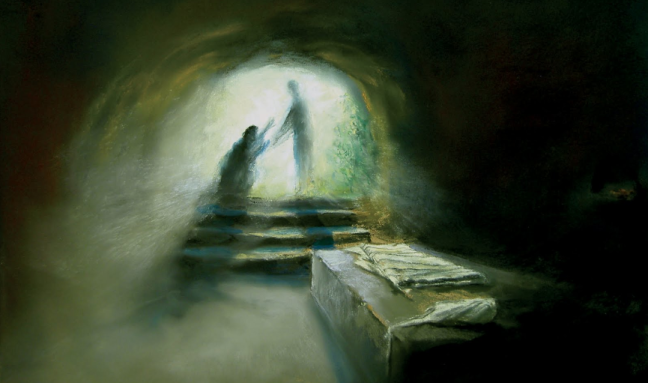
Since Christmas, we’ve been journeying through the Gospel of John on Sunday mornings. We’ve seen the careful theological construction of his story-telling. He begins with the majestic prologue of the first chapter which retells and reframes the story of creation (Genesis 1-2) as the beginning of the gospel good news. Here, at the very end of the gospel of John, we return to the garden where Mary (and we by extension as the readers) experience the living resurrected Christ. It’s a narrative re-entry into the Garden of Eden. A re-creation. All things are becoming new.
John seems to insist less upon the miraculous sign of the resurrection and rather on its meaning. Jesus has restored, renewed, resurrected his relationship with those who follow his example, walking in his footsteps as disciple-friends. The strange garden doesn’t ask Mary, “What are you looking for?” but rather “Whom”? Mary’s testimony to her experience is not “I have seen Jesus again.” Rather she proclaims “I have seen the Lord.” Yet she – like the other two disciples: Peter and John – in this story sees progressively. They see without seeing until their eyes are opened through experience, interpretation and a living word. They encounter the resurrected Jesus like Nicodemus slowly comes to see clearly through the gospel from John 3 until now, like the blind man in John 9 who knows Jesus healed him but doesn’t know who Jesus is, or recognizes him until further encounters. Mary recognizes the risen Jesus, the Good Shepherd, when he calls her by her name. [John 10:1-18] It’s the working out of his proclamation in John 9:39: “I came into this world for judgment so that those who do not see may see, and those who do see may become blind.” You can’t see without having sight reflected and interpreted back to you.
It’s not just the end of the gospel it’s the telos of it. John 13 (the beginning of the Last Supper) has the narrator saying that Jesus “that his hour had come to depart from this world and go to the Father. Having loved his own who were in the world, he loved them to the end.” John 13:1. Curiously the word for “end” in Greek is telos which means not just the chronological end, but the objective end, the goal of an action. His cross is the end (in both senses) of his life journey. It’s also the beginning of something new, beyond that telos: a new creation. A new life. A new beginning. That’s who Mary has seen and who opened her eyes.
Questions for the practice of Examen & Contemplation
- What shimmers for you in this story?
- Imagine yourself in this scene. Are you more like Peter, John (the loved disciples), Mary, or an onlooker?
- The story is actually two stories: the discovery of the empty tomb, and Mary’s encounter of Jesus. How do you find it to be rational?; irrational?; trust-worthy?; vexing?
- How has your life changed since you have seen the Lord? How has the lives of others? What does that reveal about the promise and practice of resurrection for us today?
Download the PDF textual study sheet that we use in our discussion class at @CAPCOakland :: [PDF HERE]